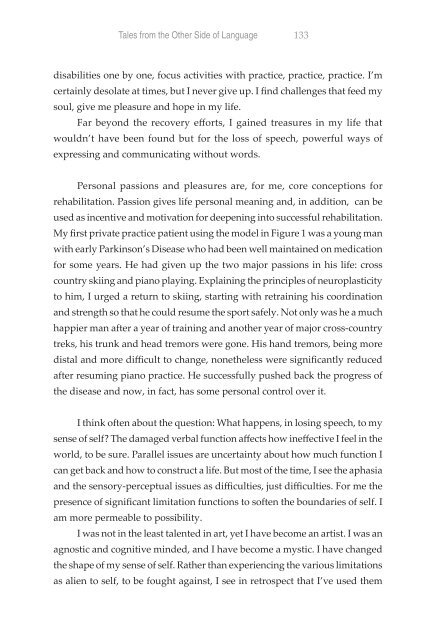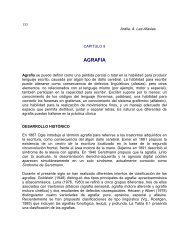the PDF of her book - National Aphasia Association
the PDF of her book - National Aphasia Association
the PDF of her book - National Aphasia Association
Create successful ePaper yourself
Turn your PDF publications into a flip-book with our unique Google optimized e-Paper software.
Tales from <strong>the</strong> O<strong>the</strong>r Side <strong>of</strong> Language 133<br />
disabilities one by one, focus activities with practice, practice, practice. I’m<br />
certainly desolate at times, but I never give up. I find challenges that feed my<br />
soul, give me pleasure and hope in my life.<br />
Far beyond <strong>the</strong> recovery efforts, I gained treasures in my life that<br />
wouldn’t have been found but for <strong>the</strong> loss <strong>of</strong> speech, powerful ways <strong>of</strong><br />
expressing and communicating without words.<br />
Personal passions and pleasures are, for me, core conceptions for<br />
rehabilitation. Passion gives life personal meaning and, in addition, can be<br />
used as incentive and motivation for deepening into successful rehabilitation.<br />
My first private practice patient using <strong>the</strong> model in Figure 1 was a young man<br />
with early Parkinson’s Disease who had been well maintained on medication<br />
for some years. He had given up <strong>the</strong> two major passions in his life: cross<br />
country skiing and piano playing. Explaining <strong>the</strong> principles <strong>of</strong> neuroplasticity<br />
to him, I urged a return to skiing, starting with retraining his coordination<br />
and strength so that he could resume <strong>the</strong> sport safely. Not only was he a much<br />
happier man after a year <strong>of</strong> training and ano<strong>the</strong>r year <strong>of</strong> major cross-country<br />
treks, his trunk and head tremors were gone. His hand tremors, being more<br />
distal and more difficult to change, none<strong>the</strong>less were significantly reduced<br />
after resuming piano practice. He successfully pushed back <strong>the</strong> progress <strong>of</strong><br />
<strong>the</strong> disease and now, in fact, has some personal control over it.<br />
I think <strong>of</strong>ten about <strong>the</strong> question: What happens, in losing speech, to my<br />
sense <strong>of</strong> self? The damaged verbal function affects how ineffective I feel in <strong>the</strong><br />
world, to be sure. Parallel issues are uncertainty about how much function I<br />
can get back and how to construct a life. But most <strong>of</strong> <strong>the</strong> time, I see <strong>the</strong> aphasia<br />
and <strong>the</strong> sensory-perceptual issues as difficulties, just difficulties. For me <strong>the</strong><br />
presence <strong>of</strong> significant limitation functions to s<strong>of</strong>ten <strong>the</strong> boundaries <strong>of</strong> self. I<br />
am more permeable to possibility.<br />
I was not in <strong>the</strong> least talented in art, yet I have become an artist. I was an<br />
agnostic and cognitive minded, and I have become a mystic. I have changed<br />
<strong>the</strong> shape <strong>of</strong> my sense <strong>of</strong> self. Ra<strong>the</strong>r than experiencing <strong>the</strong> various limitations<br />
as alien to self, to be fought against, I see in retrospect that I’ve used <strong>the</strong>m



